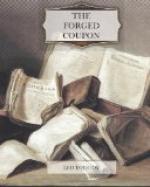began to wash and dress. His water was ready,
and everything on the washing-stand and dressing-table
was ready for use and properly laid out—his
soap, his tooth and hair brushes, his nail scissors
and files. He washed his hands and face in a leisurely
fashion, cleaned and manicured his nails, pushed back
the skin with the towel, and sponged his stout white
body from head to foot. Then he began to brush
his hair. Standing in front of the mirror, he
first brushed his curly beard, which was beginning
to turn grey, with two English brushes, parting it
down the middle. Then he combed his hair, which
was already showing signs of getting thin, with a
large tortoise-shell comb. Putting on his underlinen,
his socks, his boots, his trousers—which
were held up by elegant braces—and his
waistcoat, he sat down coatless in an easy chair to
rest after dressing, lit a cigarette, and began to
think where he should go for a walk that morning—to
the park or to Littleports (what a funny name for
a wood!). He thought he would go to Littleports.
Then he must answer Simon Nicholaevich’s letter;
but there was time enough for that. Getting up
with an air of resolution, he took out his watch.
It was already five minutes to nine. He put his
watch into his waistcoat pocket, and his purse—with
all that was left of the hundred and eighty roubles
he had taken for his journey, and for the incidental
expenses of his fortnight’s stay with his cousin—and
then he placed into his trouser pocket his cigarette-case
and electric cigarette-lighter, and two clean handkerchiefs
into his coat pockets, and went out of the room, leaving
as usual the mess and confusion which he had made
to be cleared up by Stephen, an old man of over fifty.
Stephen expected Volgin to “remunerate”
him, as he said, being so accustomed to the work that
he did not feel the slightest repugnance for it.
Glancing at a mirror, and feeling satisfied with his
appearance, Volgin went into the dining-room.
There, thanks to the efforts of the housekeeper, the
footman, and under-butler—the latter had
risen at dawn in order to run home to sharpen his
son’s scythe—breakfast was ready.
On a spotless white cloth stood a boiling, shiny,
silver samovar (at least it looked like silver), a
coffee-pot, hot milk, cream, butter, and all sorts
of fancy white bread and biscuits. The only persons
at table were the second son of the house, his tutor
(a student), and the secretary. The host, who
was an active member of the Zemstvo and a great farmer,
had already left the house, having gone at eight o’clock
to attend to his work. Volgin, while drinking
his coffee, talked to the student and the secretary
about the weather, and yesterday’s vint, and
discussed Theodorite’s peculiar behaviour the
night before, as he had been very rude to his father
without the slightest cause. Theodorite was the
grown-up son of the house, and a ne’er-do-well.
His name was Theodore, but some one had once called
him Theodorite either as a joke or to tease him; and,




